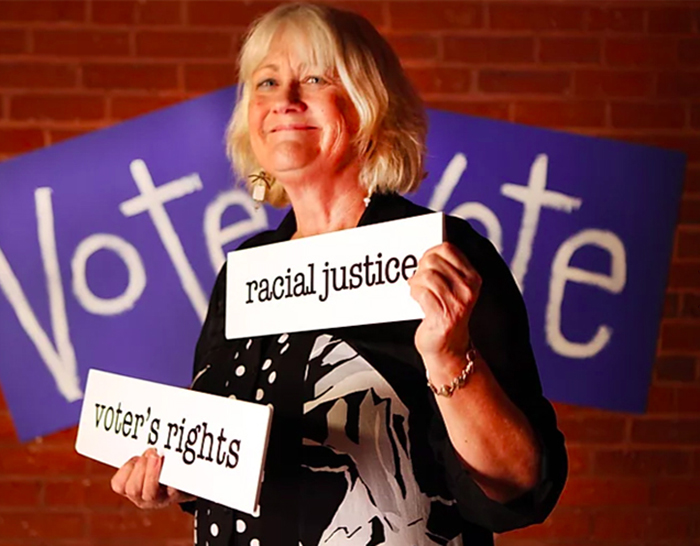Armed for the Good Fight: Battling COVID-19 With Contact Tracer Jeanette Millard '76

Jeanette Millard '76. Photo by Beth Greely.
Tackling sensitive topics with strangers: the making of a master communicator
by MaryAlice Bitts-Jackson
For more than 25 years, Jeanette Millard ’76 has guided corporations and professionals through a broad spectrum of challenging transitions, including global expansions, leadership shake-ups and broader cultural shifts. Then COVID-19 arrived, and the major changes she grappled with were the ones at her own front door.
What do you do when the in-person sessions you lead evaporate overnight, along with your livelihood? Millard’s solution: help fight the pandemic by applying her experience and skills in a new way.
Millard double-majored in religion and German at Dickinson, earned an M.A. in Germanic languages and literature from Tufts University and launched her career as a German-language teacher. While volunteering with Amnesty International in the U.S. and London, she discovered a new calling—organizational development. After earning an M.S. in that field and learning the ropes, Millard founded CJM Consulting in 1993.
Millard's specialized knowledge, liberal-arts background and travels and work abroad, laid the foundation for her two-decade career as a global consultant and entrepreneur. Since April, Millard has transferred her high-level skills to her work as a contact tracer in Massachusetts, where she now lives.
Working through PIH/Mass DPH Community Tracing Collaborative, an organization that previously traced communicable diseases in the developing world, Millard speaks by phone with newly diagnosed COVID-19 patients, five days a week. She asks patients and their families to quarantine and gathers information about symptoms and the people they’ve interacted with, back to two weeks before they were symptomatic. Millard also answers questions about the virus, advises how to keep family members safe and asks if patients need assistance—someone to deliver food, for example, or a doctor visit. If they do, she places a request through her employer.
It’s not easy to broach sensitive topics with strangers. Adding to the difficulty, patients are stressed and typically don't feel well. Cultural differences, including varying attitudes toward illness itself, can interfere with the process—especially since there's a disproportionate number of minority and immigrant workers who work hourly service and health-care jobs and are therefore vulnerable to the illness because they cannot work from home. A highly charged political environment creates additional potential challenges.
Millard is uniquely prepared to bridge those gaps. Having lived, worked and traveled internationally, she’s conversational in Spanish, Arabic and Mandarin, as well as fluent in English and German—and if she needs an interpreter, she simply remotely patches one in. More importantly, she’s a communicator by profession and an expert in intercultural competency. She readily puts clients at ease.
“People can be reserved at first,” says Millard, who checks in daily with each client throughout the course of their illness, “but by the last call, there are often tears as we say goodbye for the last time, because we’ve gotten to know each other well.”
The process is exhausting and sometimes discouraging. But it’s also vital, gratifying work.
“The people who most get hit by COVID-19 it are the ones who can least afford to miss work, and they often have no insurance,” Millard says. “I feel very lucky to be able to help them, and I feel lucky to do my part to help stop the spread of the pandemic.”
TAKE THE NEXT STEPS
Published December 10, 2020